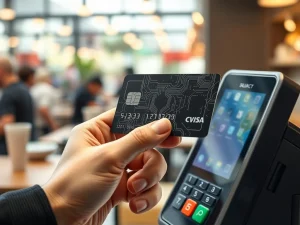🚨 Urgent Warning: Jameson Lopp Exposes Dire Bitcoin Address Poisoning Threat

Are you a Bitcoin holder? A silent, insidious threat is lurking in the crypto space, and it’s called Bitcoin address poisoning. Imagine sending your hard-earned Bitcoin to what you believe is a familiar address, only to realize it’s been diverted to a scammer’s wallet. This nightmare scenario is becoming increasingly real, and crypto security expert Jameson Lopp is sounding the alarm. Let’s dive into what this dangerous scam is all about and how you can protect yourself.
What is Bitcoin Address Poisoning and Why Should You Care About Crypto Security?
Bitcoin address poisoning is a sophisticated social engineering attack targeting cryptocurrency users. It preys on our habits of reusing and copying addresses from transaction history. Scammers cleverly generate addresses that mimic the beginning and end characters of addresses you’ve used before. In a rush, or with less attentive scrutiny, you might mistakenly select the poisoned address from your history, thinking it’s the correct one. The result? Your funds vanish into the attacker’s pocket.
Why is this a growing concern for crypto security?
- Exploits Familiarity: It leverages your trust in your own transaction history, making it psychologically effective.
- Subtle Deception: The addresses look strikingly similar to legitimate ones at a glance.
- Increasing Prevalence: As Jameson Lopp’s analysis reveals, these attacks are becoming more frequent and organized.
Jameson Lopp’s Dire Warning: Unpacking the Address Poisoning Threat
Jameson Lopp, a respected figure in the crypto world and CSO at Casa, didn’t just casually mention this issue. He conducted a thorough analysis of the Bitcoin blockchain and uncovered some alarming trends. According to Lopp’s research, these address poisoning attacks first appeared in July 2023, with a significant surge starting in December 2023 and continuing into early 2025. He identified nearly 48,000 transactions fitting the profile of potential address poisoning over just 18 months. This isn’t a small-scale issue; it’s a growing epidemic in the crypto space.
Lopp’s findings are a stark reminder that even seasoned crypto users can fall victim to these scams. His warning isn’t meant to instill fear, but to promote vigilance and better crypto security practices.
Real-World Impact: Address Poisoning Attacks on the Rise
The numbers speak for themselves. Cybersecurity firm Cyvers reported that over $1.2 million was stolen through address poisoning attacks in March 2025 alone. This follows a staggering $1.8 million lost in February, as reported by Cyvers CEO Deddy Lavid. While these figures might seem smaller compared to massive exchange hacks, they represent direct losses to individual users – losses that could be devastating.
Furthermore, PeckShield estimates total losses from crypto hacks in Q1 2025 exceeding $1.6 billion. While the Bybit hack accounts for a large portion, the consistent drip of losses from scams like Bitcoin address poisoning adds up to a significant drain on the crypto ecosystem. It erodes trust and highlights the urgent need for enhanced crypto security measures.
Protecting Yourself from Bitcoin Scams and Address Poisoning
So, how do you shield yourself from these cunning Bitcoin scams and specifically, address poisoning attacks? Jameson Lopp and other security experts offer crucial advice:
- Double, Triple, Quadruple Check Addresses: This is the golden rule. Before sending any Bitcoin, meticulously verify every character of the destination address. Don’t just rely on visual similarity.
- Utilize Wallet Address Books: Instead of copying from history, create and use your wallet’s address book. Manually enter and verify addresses when you first add them, and use these saved entries for future transactions.
- Demand Full Address Display: Lopp advocates for wallet interfaces to always display the full address, not just truncated versions. This reduces the risk of overlooking subtle differences.
- Be Wary of Copy-Pasting: While convenient, copy-pasting addresses can be risky. Consider manually typing addresses, especially for large transactions, or use QR codes when possible.
- Stay Updated on Security Threats: Keep yourself informed about the latest crypto security threats and scam tactics. Resources like news articles, security blogs, and community forums can be invaluable.
Beyond Address Poisoning: The Broader Landscape of Crypto Scams
Address poisoning attacks are just one piece of a larger puzzle. The crypto world is unfortunately rife with scams, exploits, and hacks. Cybersecurity experts often link sophisticated attacks to groups like the North Korean Lazarus Group, known for their elaborate social engineering schemes. These schemes can range from fake job offers and Zoom meetings with phony venture capitalists to classic phishing attempts on social media. They are constantly evolving, making vigilance paramount.
The Bybit hack, mentioned earlier, serves as a stark example of the scale of these threats. While not directly related to address poisoning, it underscores the need for robust security practices across the entire crypto ecosystem – from exchanges to individual wallets.
Conclusion: Stay Vigilant in the Face of Evolving Crypto Threats
Jameson Lopp’s warning about Bitcoin address poisoning is a timely and crucial reminder. The crypto space, while offering incredible opportunities, also presents significant risks. As scammers become more sophisticated, our defenses must become equally robust. By understanding the nature of threats like address poisoning attacks, practicing meticulous transaction hygiene, and staying informed about the ever-evolving landscape of crypto security, we can collectively build a safer and more trustworthy crypto future. Don’t let complacency be your downfall – stay vigilant, stay informed, and protect your digital assets.










